.
Wow… It’s been a crazy year! Most thought 2010 was crazy, what with Marvel and DC and digital comics… and now that I look back at the year past, it wasn’t quite that momentous, which is probably a good thing. Lots happened yet I was a bit challenged to think of what the biggest story of the year was… because there wasn’t anything which seemed historic… it’s more like a footnote, or a subordinate clause in a larger paragraph.
Retail
Borders officially declared bankruptcy, failed to find a buyer, and within six months was liquidated. Like a terminally ill relative, this wasn’t unexpected, as Borders had been faltering for many years. Borders was a large supporter of graphic novels, and was instrumental in popularizing manga in the United States. What effect this has on comics publishers and distributors will probably not be known. Creditors are expected to get ten cents on the dollar.
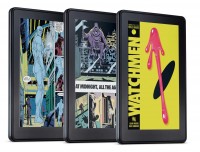
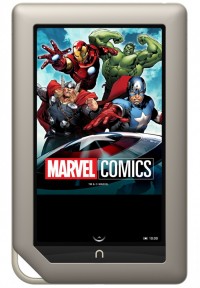
Comics shops? Some went out of business (Atomic Comics, Al’s Comics, Comic Vault), some reopened with new ownership (Comic Relief > The Escapist / Fantastic Comics, Cosmic Comics > Manhattan Comics & More), and some were brand new (Little Island Comics, a shop devoted to kids and the comics they love!)
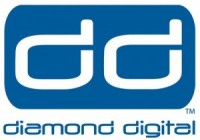
Another big development for retailers? Early shipping to stores! Stores in good standing with Diamond can get delivery of Wednesday shipments on Tuesday, so long as the merchandise is not sold before Wednesday. This program has been successful, with a few retailers caught breaking the agreement, but with almost no mention of it in the comics community after the initial roll-out.
Media
Lots of comics movies in 2011, almost all of them major properties. Some did better than others, most will have sequels. Cowboys & Aliens was the biggest flop, so big even studio executives admitted mistakes were made. Some sequels performed horribly, possibly foretelling the end of some franchises, or a move to direct-to-digital (since DVDs are slowly marching to the fabled Media Graveyard).
The Hollywood box office was down this year, 3% in receipts (even though prices were higher for 3-D films). (Hmmm… where have I seen that before?) Attendance dropped to a 16-year low. The top three movies of the year had strong fanbases: Harry Potter 7.2, Transformers 3, and Twilight 4.1.
Television was also a mixed bag. Walking Dead was a big hit, while Wonder Woman was dead on arrival. There’s lots of geeky memes on television, long gone are the days when geeks would plotz over the sight of a Sandman poster in the background, a Superman magnet on a refrigerator, or comics creators appearing in an episode. Numerous comics are in development as television series, but frequently they don’t develop. Walking Dead and The Big Bang Theory will continue to inspire Hollywood to produce similar series, but you’re more likely to see cartoon adaptations than live action on television.
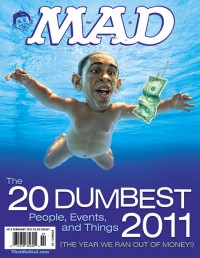
Publishers
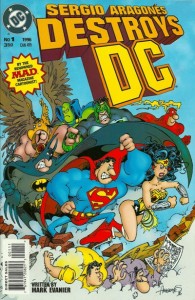
At Marvel, things were pretty much like previous years, with various events, gluts of titles to tie-in with superhero movies, and titles going out of print to reappear a few years later, like a third-tier villain. The biggest event this year at Marvel? A return of “Marvelcution” as many staffers were either fired by Disney or by Marvel. Will Marvel’s output replicate those of the 1990s? Or will Marvel figure out the mass market with help from Disney Publishing Worldwide?
Other publishers? Disney pulled most of their licenses from Boom! Studios. Boom had seen this coming when Disney purchased Marvel, and launched their Kaboom! imprint, landing a license almost as colossal as Mickey Mouse: Peanuts. Most publishers which publish comic books (and there aren’t many) now offer digital editions simultaneous with paper editions, and, for the most part, retailers haven’t been too fearful.
Two significant publishers ceased publication. Tokyopop halted production immediately, leaving many series unfinished and some licenses in limbo. Royalty compensation as well as who owned which copyrights clouded the announcement. Wizard Magazine ceased publishing a paper magazine, moving completely to digital. The revolving door at the magazine continued to spin, with company founder Gareb Shamus leaving the corporation in December.
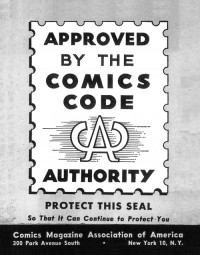
Self-publishing, already supported by web comics readers and smartphone apps, became more mainstream as Kickstarter campaigns raised capital for deserving projects. As the web became more of a source of funding, the Xeric Foundation announced the end of its 20-year program of funding self-publishers. Art schools continue to recruit cartoonists with specialized programming, creating a diaspora of comics colonies throughout the United States, with small regional comics show of some sort to promote local artists.
Everything else
- Rob Granito gets an Internet beat down, Sharon Moody starts a discussion. (Yet no one questions comics artists when they swipe homage iconic covers without attribution, let alone a design fee)
- Vermont gets a Comics Laureate! (But Alaska did it first.)
- Copyright rulings favor Marvel, not Kirby or Friedrich. Antarctic Press agrees to a Temporary Restraining Order while it negotiates with The Wimpy Kid. Tintin is not racist. George Lucas loses a battle with the empire.
Retro-spection
Well, here was my prognostication from last year.
Graphic novel E-books continue to be a minor subcategory of e-books.
DC managed to bring lapsed readers back into comics shops with the New 52.
No “Digital Direct Market” yet, as digital comics aren’t a thriving market yet.
Some publishers migrated from Diamond, but no major clients, and Diamond Books did gain some new clients as well (including the Angry Birds folks.)
The Biggest Story?
Geez… there really didn’t seem to be one big zeitgeist of a story this year. I’ll pick:
the continuing evolution of the digital comics, e-readers, and e-books markets
as seen by the sales of the Amazon Kindle Fire, the Barnes & Noble Nook, various other tablets, and the use of these and other e-readers in libraries. What’s under the radar: self-publishing via CreateSpace and PubIt, where micropresses can sell directly to buyers without the need for extensive marketing. Big Six publishers are testing the waters with graphic novel e-books, and they, along with publishers who market to school libraries, will most likely be ones who blaze the market for graphic novel e-books.
There’s also the local comics shops. Will they actively sell digital comics? Or will various websites “drink their milkshake” by actively selling digital comics online, undercutting these stores with cheaper prices and easier downloads?
Or will the world pull a “52” and relaunch itself when the Mayan calendar ends?





After reading about Louis C.K.’s success self distributing one of his concerts as a download, it makes me wonder at what point a major comics figure might try this, with a creator owned digital exclusive. It would be kind of like the original Image artists leaving Marvel and striking out on their own.
Bri, it depends on what your definition of “major” is. Also, there are numerous digital studios or collectives doing what Image is doing, although not on as big a scale, or doing it exclusively.
John Byrne did a webcomic on his Robotics site (“You Go, Ghoul!”) which I only just discovered. While he’s no longer “hot”, he is a major comics figure.
Atomic Comics went out of business? At least Atomic Books, unrelated, is still in business, and they do sell comics: http://www.atomicbooks.com/ .
My favorite blog, Daisybrain, has a year-in-review post up now & it’s a good starting point for exploring Daisybrain: http://daisybrain.wordpress.com/2012/01/02/a-daisybrain-retrospective/ . Not exactly a comic site, but the blogger behind it is a comic genius.
@Bri…I had no idea that LCK did that! Getting back on topic, I think the thing that is stopping most creators from doing something like that is figuring out what an appropriate price point is.
I guess by major, I mean someone who has a big enough fan base to make some noise. Even a digital exclusive for a period of time would be interesting, although comic stores would be up in arms. But those kind of experiments have happened in other media (like Radiohead releasing their album digitally for whatever you wanted to pay for it or CD’s only available at Best Buy or Target) and will eventually happen in comics.